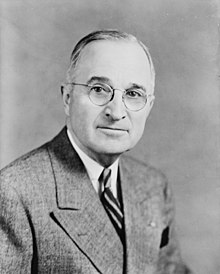Harry S Truman
| Harry S. Truman | |
|---|---|
 |
|
| 33rd President of the United States | |
|
In office April 12, 1945 – January 20, 1953 |
|
| Vice President |
None (1945–1949) Alben W. Barkley (1949–1953) |
| Preceded by | Franklin D. Roosevelt |
| Succeeded by | Dwight D. Eisenhower |
| 34th Vice President of the United States | |
|
In office January 20, 1945 – April 12, 1945 |
|
| President | Franklin D. Roosevelt |
| Preceded by | Henry A. Wallace |
| Succeeded by | Alben W. Barkley |
|
United States Senator from Missouri |
|
|
In office January 3, 1935 – January 17, 1945 |
|
| Preceded by | Roscoe C. Patterson |
| Succeeded by | Frank P. Briggs |
| Presiding Judge of Jackson County, Missouri | |
|
In office January 1, 1927 – January 3, 1935 |
|
| Preceded by | Elihu W. Hayes |
| Succeeded by | Eugene I. Purcell |
| Judge of Jackson County, Missouri's Eastern District | |
|
In office January 1, 1923 – January 1, 1925 |
|
| Preceded by | James E. Gilday |
| Succeeded by | Henry Rummel |
| Personal details | |
| Born |
May 8, 1884 Lamar, Missouri, U.S. |
| Died |
December 26, 1972 (aged 88) Kansas City, Missouri, U.S. |
| Resting place |
Harry S. Truman Presidential Library and Museum Independence, Missouri |
| Political party | Democratic |
| Spouse(s) | Bess Wallace (m. 1919) |
| Children | Margaret Truman |
| Education |
Independence High School Kansas City Law School (withdrew) |
| Profession |
|
| Religion | Baptist |
| Signature |  |
| Military service | |
| Allegiance |
|
| Service/branch | |
| Years of service |
|
| Rank | |
| Commands |
|
| Battles/wars |
World War I |
|
|
World War I
Harry S. Truman (May 8, 1884 – December 26, 1972) was an American politician who served as the 33rd President of the United States (1945–53), coming to office on the death of Franklin D. Roosevelt in the last months of World War II. He is known for launching the Marshall Plan to rebuild the economy of Western Europe, for leading the Cold War against Soviet and Chinese communism through the Truman Doctrine and NATO, and intervening in the Korean War. In domestic affairs, he was a moderate Democrat whose liberal proposals were a continuation of Franklin Roosevelt's New Deal, but the Conservative-dominated Congress blocked most of them. He holds the record for vetoes at 180, and saw 12 overridden by Congress; Gerald Ford later tied that record. Under Executive Order 9981, he used presidential authority to desegregate the armed forces.
Truman served as a United States Senator from Missouri (1935–45) and briefly as Vice President (1945) before he succeeded to the presidency on April 12, 1945 upon the death of Franklin D. Roosevelt. He presided over an unexpected surge in economic prosperity as America sought readjustment after long years of depression and war. His political coalition was based on the white South, labor unions, farmers, ethnic groups, and traditional Democrats across the North. Truman was able to rally these groups of supporters during the 1948 presidential election and win election to a presidential term in his own right.
...
Wikipedia
